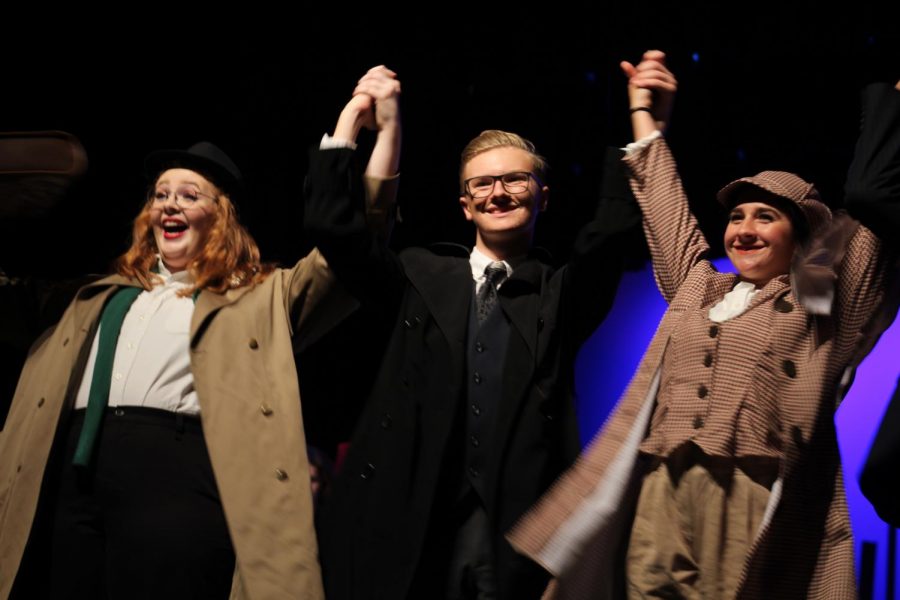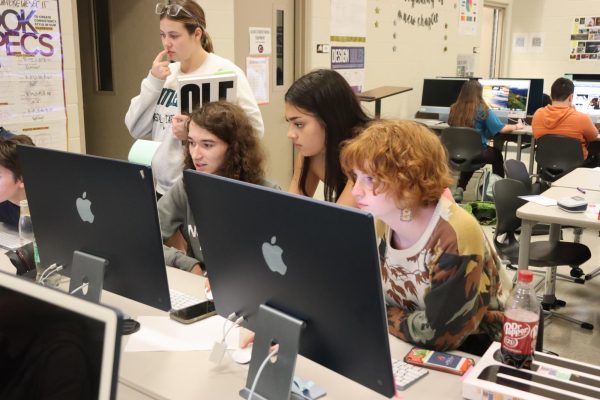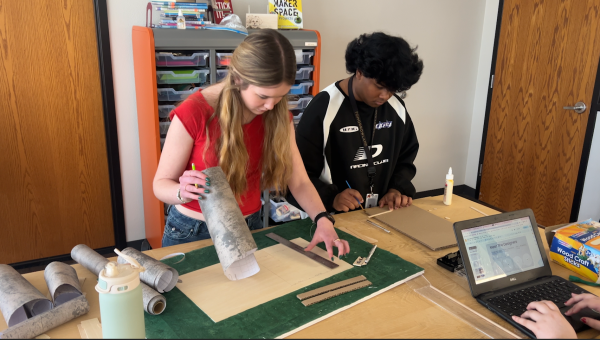Lights, Camera, Riley
The lights go down. The audience grows silent. Actors are in their places onstage, and after they exchange a few lines, the star, Riley Wolfe takes the stage. But it’s not Riley that walks out. It’s Trent Trowell, Private Investigator. This man is not a high school sophomore taking theatre classes, he is a renowned and quirky detective who is cocky and easily distracted. The weeks preparing have paid off, and he delivers his lines with confidence and ease.
Riley Wolfe played the lead role in the theatre department’s fall play: “A Lighter Shade of Noir.” This was his first lead in a production, and it lived up to his expectations. Wolfe describes his experience in a single word as “unexpected.” He said the role, the experience, everything was completely new and totally surprising.
“I didn’t expect to be the lead of the show; I didn’t expect to be friends with the people I’m friends with now; I didn’t expect to share the memories with the people I shared them with,” Wolfe said.
The news that he had received this part also elicited excitement in his family. His father in particular was almost as surprised as Wolfe.
“I was eating dinner, and I auditioned originally for another character, and I thought I would never on earth get this part, and I looked at the cast list at dinner, I nearly choked on my food, my dad almost spit out his tea, and I had the lead,” Wolfe said.
“Honestly, I was terrified, my heart skipped a beat, I was so torn, I was happy, I was excited, but I was scared. But I was willing to do it, because it was the biggest role I had ever gotten; I was like ‘No, I can’t turn this down, I need to do it.’”
Memorizing all the lines took unprecedented amounts of time and energy. It required help from family, friends and castmates, as well as pure dedication and hard work.
“I spent hours and hours on it, running lines with myself, asking castmates to help me, I texted our group chat Friday night at like 11:30 p.m. like ‘Hey, can someone help me with lines?’” Wolfe said. “I stayed up ‘till like 1 a.m. doing it. I did anything I could to get my lines down.”
Theatre directors assisted in this difficult task of learning so many words for his part; they provided help and ideas for ways to memorize lines to make sure that Wolfe and his fellow actors would be prepared.
“Mr. Dassinger, one of our directors, gave me a really good way of memorizing my monologues, which was to read through each sentence until I had each sentence individually memorized, and then put them all together and read through as many times until I had them memorized,” Wolfe said.
“With individual lines, I would repeat groups of them together, and then read two groups together and repeat those.”
While the memorization of lines, as well as countless rehearsals, took up a large portion of the actor’s time, Wolfe had few problems with time management. However, this dedication required him to work whenever possible so he could get everything done.
“It was not as [difficult to balance other commitments] as I thought; last year I had a lot of conflicts being in a musical, because I was in tech, which still didn’t really matter that much, but I was on the golf team, so I had to manage golf practice, the show, and homework; now I cleared everything just so I could do theatre, so I had a pretty open schedule; the most I had to do was an occasional project, otherwise I didn’t have many problems with schedules,” Wolfe said. “I took any opportunity I had to work.”
Though the time management did not prove to be a huge struggle for Wolfe, other aspects made up for that. His character, Trent Trowell, was required to address the audience in a number of monologues throughout the play. This provided a challenge for the sophomore, but he overcame it.
“This was the first time I actually had to acknowledge the audience,” Wolfe said. “I originally never wanted to wear glasses during a performance so I couldn’t see the audience that well, so this was a whole new spin on things, because now not only was I aware that the audience was there, but my character was aware that the audience was there.”
He found this type of acting more difficult than just talking to other characters because it created more pressure to maintain the interest of the viewers.
“I really had to keep them entertained while I was talking, because I didn’t want it to be like if something’s going on, I didn’t want to stop it and I didn’t want for everyone to be like ‘Ugh, not this guy again,’” Wolfe said. “I found it really difficult to watch my tone of voice so I didn’t sound the same and watch my body movements.”
Another challenge he faced was working with upperclassmen that he did not already know, but whose work he was familiar with.
“[Working with upperclassmen] was really nerve-racking for me, because I’ve seen all of these people in shows before, so I already had a very deep respect and love for them, but I felt really nervous, not being around them, I was comfortable around them, I felt nervous because I wanted to make an impression, and I wanted to really show them that I know what I’m doing, that I can do it.”
While all these presented their own difficulties, for Wolfe, the most troublesome aspect was the memorization of lines. Though he utilized strategies, this was still extremely trying.
“The hardest part of playing the lead role was definitely the lines; our director told us to break up all of our lines into sentences, and I had 261 sentences, so that was really challenging for me,” Wolfe said. “I never thought ever I would be able to memorize them but I did, so that was amazing.”
Though the lines were the most challenging aspect, the central role of his character proved to be Wolfe’s favorite.
“The most fun part about this role was depending on the plot and having the other actors depend on me, because the characters I’ve played in the past were side characters or comic relief or something like that, which didn’t really matter to the plot,” Wolfe said. “With this one I was happy that everyone, including the upperclassmen, would depend on me- not that they had to but, you know, that I would really matter to the plot and be important to the show as a production.”
Because they depended on each other so much, the students involved in the production grew close over the course of rehearsals and shows. Much of this was facilitated by Wolfe and by his castmates.
“We all kinda hung out outside of rehearsals,” Wolfe said. “One of the first times I started hanging out with people I texted only a couple of people like ‘Hey, I’m trying to get to know everyone, do you guys wanna come over and like play games and just hang out and have food?’ and then after a football game, we met at someone’s house and just talked, so everyone kinda formed groups at first, and then they all spread out and now everyone is closer friends. We just shared experiences with each other.”
These castmates were extremely supportive of Wolfe, and they all helped each other through stress and fear.
“I wasn’t that stressed in the early weeks of the show, like when I started memorizing lines; as I became more familiar with them I was excited, I was so happy that I was starting to memorize, I was ready to go to rehearsals, but suddenly, the day of opening night, I just got hit with a wave of stress and I was freaking out,” Wolfe said. “My stage manager brought me coffee and donuts, and everyone did the best they could to help me with not being stressed and it worked. Moments before stepping on stage, I felt like my heart was about to explode, but I got it under control and it was good.”
Though he is only a sophomore, Wolfe has begun looking at colleges that would allow him to pursue his goals, such as Baylor University and Boulder University.
“I’ve been more focused on pursuing a medical degree, but as my career in theatre has been progressing, I’ve really considered trying to find an acting college or something like that, so I’m open, I’m looking, but I haven’t really considered anything yet,” Wolfe said.
Wolfe felt that participating in theatre was completely different than other activities, and provided an enormously fun activity that allowed him to change the way people feel.
“It’s a really unique thing to do, like you go there at the end of school, you go out onto a stage, and you get to entertain people,” Wolfe said. “I like to make people smile or to make people cry, in a good way like in a performance way cry, to feel emotion when watching that show. It’s fun to go with people that are really nice after school and put on this character who’s cocky or crazy or weird or an average Joe and save the day or get the girl or whatever, and I think that’s a really interesting thing to be doing, especially in high school.”








